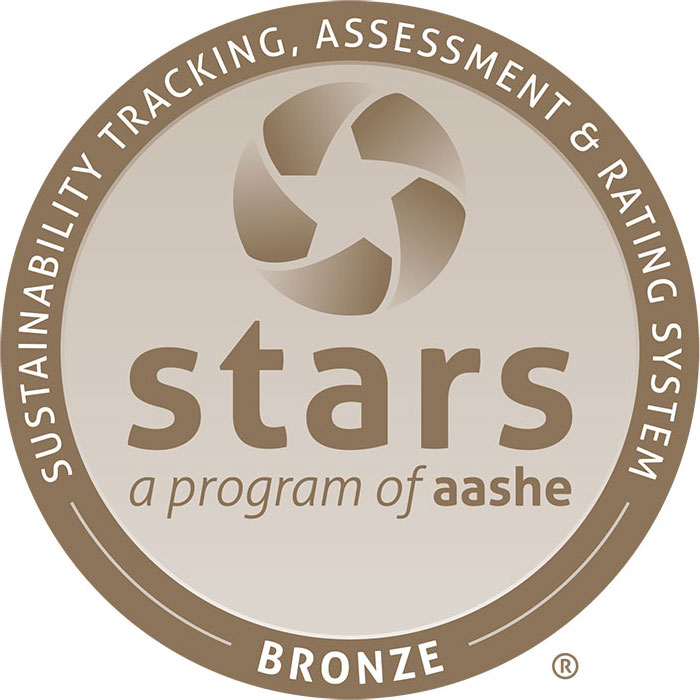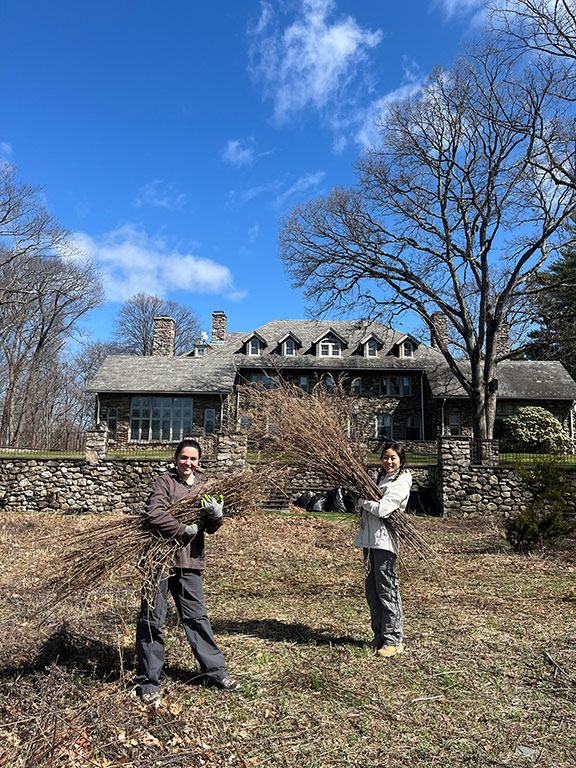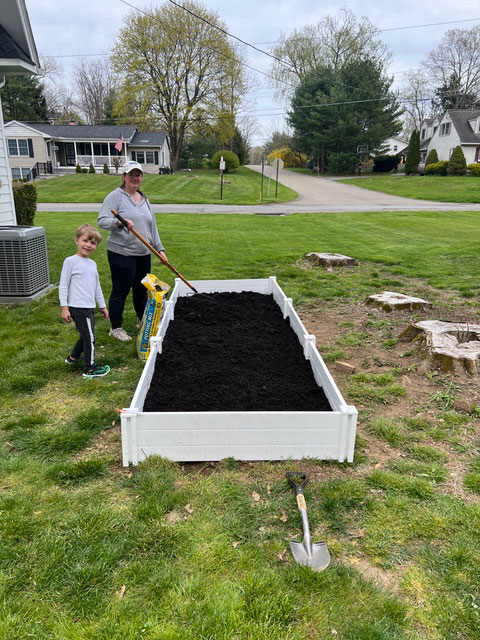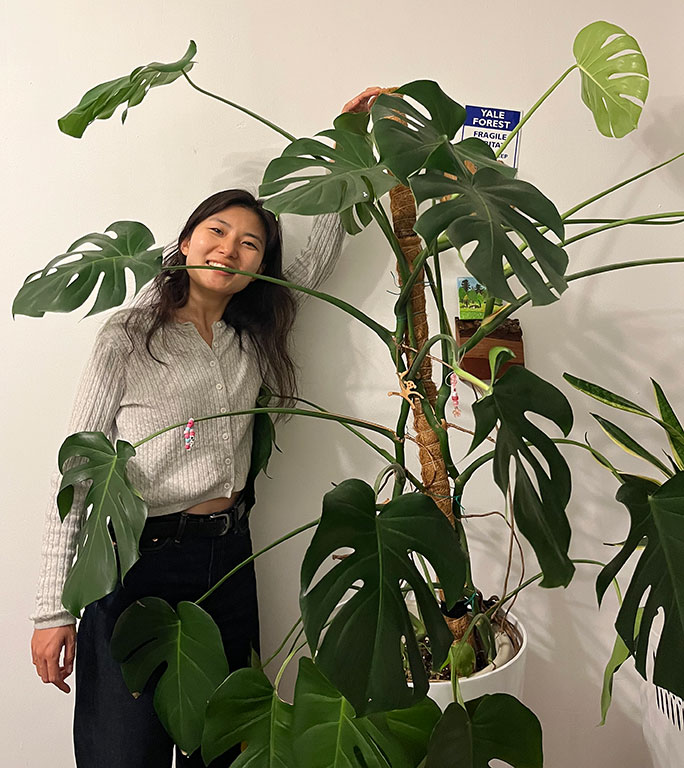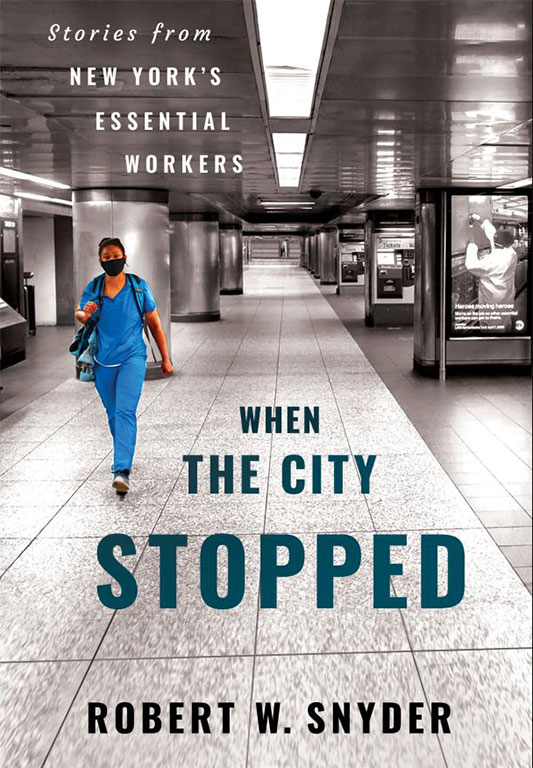On April 2, the Association for the Advancement of Sustainability in Higher Education (AASHE) awarded the University a bronze rating in its Sustainability Tracking, Assessment & Rating System, known as AASHE STARS. The system was created in 2006 as a way to measure and encourage sustainability in all aspects of higher education.
The ratings are based on five areas: academics, engagement, operations, planning and administration, and innovation and leadership. There are 389 colleges and universities in the United States with AASHE STARS ratings, ranging from bronze to platinum.
Jasmine Petrov, a 2022 graduate of Fordham College at Lincoln Center who supervised the data collection for Fordham’s Office of Sustainability, said the rating was particularly valuable not only because it provides concrete evidence of the types of progress the University has made since it committed in 2007 to becoming a greener campus, but also because it highlights areas that may need improvement. That helps the University decide where to devote resources in the future.
“You need to understand what is operating well and what isn’t at this moment before you can create an actionable plan to improve on it,” she said.
Data Collected By Students
Students who interned with the Office of Sustainability were key to the project, as many collected the data that was submitted to AASHE. The data that was submitted earned 41.82 points in AASHE’s scoring system, earning Fordham the bronze rating.
The University ranked highest in the area of engagement, thanks to initiatives such as the $50 million grant from the Environmental Protection Agency, which it secured to work with vulnerable communities in New York, New Jersey, Puerto Rico, and the U.S. Virgin Islands.
A silver rating, which can be obtained with 45 points, is imminently reachable for Fordham, said Petrov. Some of the sustainability efforts just need to be better documented, she said, both in facilities and other areas.
“When I was collecting the data, I had to speak not only with people who are in charge of facilities but also people who are in charge of the library about how open and accessible research is,” said Petrov, who is pursuing a master’s degree in healthy cities at International University of Catalonia in Barcelona, Spain.
“You may not think that’s sustainability, but to be sustainable, you have to have access to information that can advise you on that. Now we have this avenue to say, ‘these are the guidelines we should use to achieve this’.”
]]>The National Gardening Association has plenty of great tips for aspiring gardeners, but we also know Fordham has some amazing weed warriors and green gurus willing to share advice on how to make this season a fruitful one.
Preparing Beds for Flowers
As Fordham’s assistant gardener, Jason Cruz oversees the planting of 200 to 300 hydrangeas, pansies, geraniums, and sunpatiens around the Rose Hill campus. High-profile areas like the space around Cunniffe House need to look their absolute best for Easter, so the past few weeks have been all about prepping soil beds.
To prepare the beds for the day the flowers arrive from the nursery, Cruz uses a few tricks gardeners can try at home: He mixes in soy conditioner every two years, and this time of year, he also mixes in Coast of Maine’s Dark Harbor mulch. For him, it’s both an aesthetic and a practical choice.
“We’ll plant the plants, and then we’ll throw a top dressing of the mulch, so you have this really nice dark background with all these vibrant colors.”
Planting with Pollinators in Mind
Chomri Khayi, who was hired last year as the first land manager of the Calder Center, Fordham’s biological field station in Armonk, New York, has been focused on a large pollinator garden behind Calder Hall. Her advice? For the sake of bees and other pollinators, don’t clear the ground too early.
“Everyone’s tempted to clean up everything and have this aesthetically pleasing space, but it would be wiser to minimize that cleaning as much as possible or even delay it,” she said.
She said to wait until mid to late April, when temperatures consistently stay above freezing, to clear away things like dead leaves that are carpeting the ground.
“There are beneficial insects that rely on that ground cover for protection.”
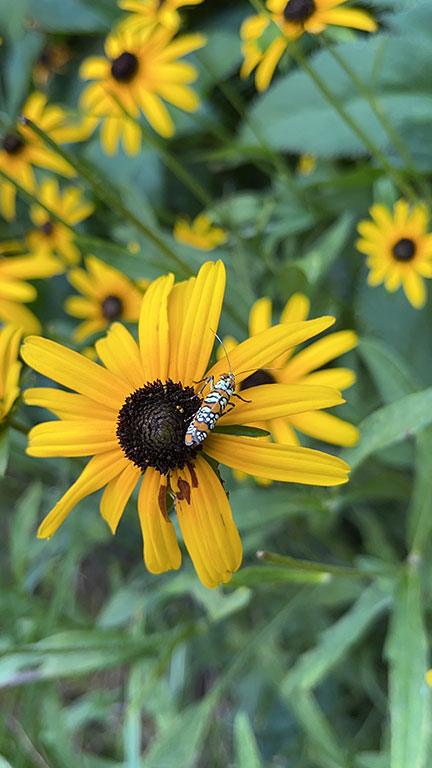
Serena Feldman, a Fordham ecology master’s student who previously worked as a land steward at the Nature Center at Greenburgh in Scarsdale, New York, recommended planting native plants when possible. Black-eyed Susans, purple coneflowers, and mountain mints are great choices, because they’re beneficial to insects and birds that are key to the local ecosystem.
“Ask yourself if you’ve ever seen a bee land on a petunia or a butterfly sit on a begonia. It just doesn’t happen because those plants weren’t bred to be valuable for pollinators in general,” she said.
Building Raised Beds
When he moved to Patterson, New York, last year, Justin Pool grew mini pumpkins, green beans, and peppers in raised beds. Pool, a senior lecturer of biological sciences and faculty director of STEM strategic initiatives, learned from that experience not to underestimate the cost of the soil you will need to fill a bed properly. He also had some advice on materials.
“For a raised bed, plain cardboard on the bottom makes for great weed control and is biodegradable, with no nasty plastic to deal with,” he said.
“Just make sure all the tape has been removed, lay it on the ground, and add your garden soil on top of it.”
Potted Plants for City Living
Annika Hinze, an associate professor of political science and director of Fordham’s Urban Studies Program, relies on pots to plant outside her house in the Bronx neighborhood of Riverdale.
“Two years ago, I discovered that Stew Leonard’s sells bags of pollinator seeds for around five bucks. I found them to be super potent, and the first week of April is the perfect time to start them,” she said.
“I also have a rhododendron, which is about to bloom. It makes the prettiest pink blossoms, and my mom, who passed away in 2021, helped me buy it. I like to think she’s saying hello every time it blooms.”
Caring for Indoor Plants
And if you live in an apartment, indoor plants also react to the changes in temperature and light that the spring brings. Khayi tends to 16 plants in her Manhattan apartment, including a very large monstera deliciosa.
“With the heat on during the winter, they tend to dry out a lot,” she said.
“So around late March, I start to feed them a little Miracle Grow every two weeks just to increase or to help them come out of the dormant phase.”
Adrian Kochanowicz is also paying special attention to his indoor plants.
In August, Kochanowicz joined Fordham’s Office of Military and Veterans’ Service, and he brought three plants to his Lincoln Center office: a calathea medallion; a philodendron hederaceum; and a Aglaonema Siam Aurora, also known as a Red Chinese Evergreen.
They get no light from the sun (he uses a grow light), but they still react to the change of the seasons, so he’s also started to fertilize them every two weeks. His advice is to water less, as it’s very easy to overdo it.
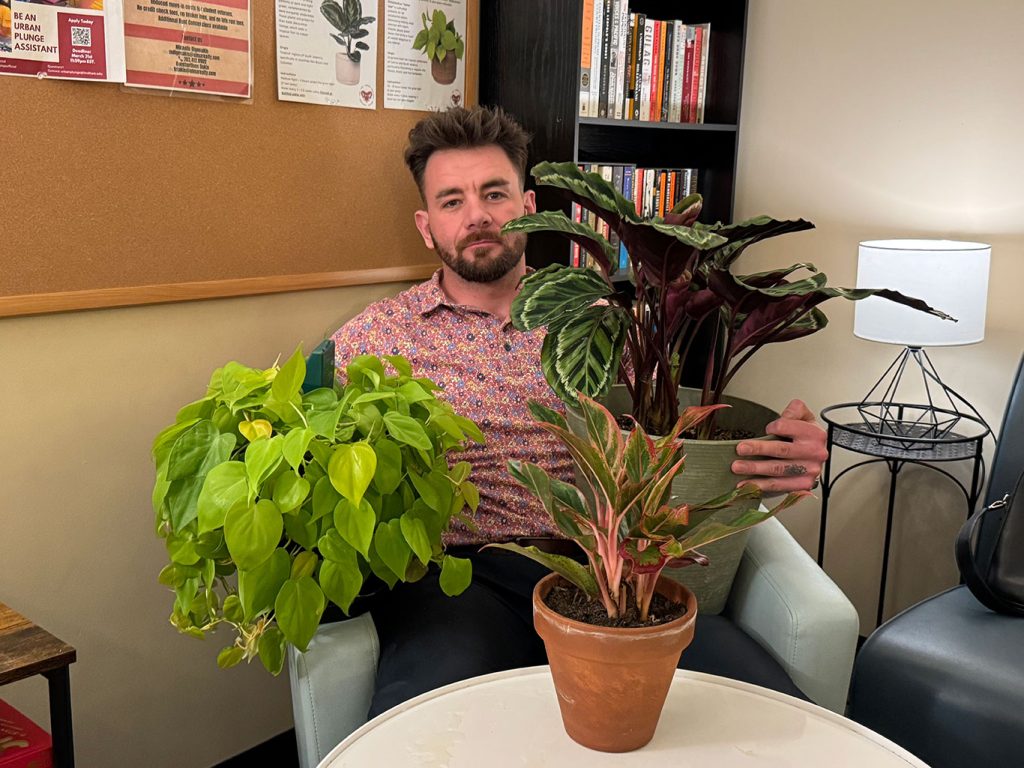
It’s the second consecutive time that two Fordham students have received the award, which is awarded annually to about 400 natural sciences, engineering, and mathematics students. A major requirement for the scholarship is a demonstrated body of research that a student has conducted since entering college.
Lorna Ronald, Ph.D., director of the Office of Fellowship Advising, said the consecutive wins show the strength of the STEM community at Fordham.
“It’s really exciting that we’ve been able to build that up over the last couple of years,” she said.
Combating Antibiotic Resistance
Clemente’s research explores how to design and develop peptides that can be used to influence DNA replication in bacteria, which can cause mutations that lead to antibiotic resistance. It’s a joint research project between chemistry professors Nicholas Sawyer and Elizabeth Thrall.
“My research so far this year has been looking at a peptide that has been known to inhibit the specific protein interaction involved in the replication of Mycobacterium tuberculosis, which is the bacteria that causes tuberculosis,” she said.
“It’s a naturally occurring antibiotic peptide, but I’m seeing if I can improve upon it and make it synthetically.”
A native of Washingtonville, New York, Clemente said the opportunity to do research sealed her decision to attend Fordham. She hopes to pursue a Ph.D. in biochemistry.
For Sawyer, ambitious and enthusiastic students like Clemente are invaluable.
“Having ambition and enthusiasm for [a research project]provides the resilience to deal with challenges along the way,” he said.
“She’s skyrocketed in terms of not only managing her own project, but also in providing peer mentoring to junior students in the lab.”
Targeting Tumors
Das, a biochemistry major who also works for Fordham University Emergency Medical Services, is focused on developing peptide-linked molecules to target cancer tumors. She hopes to attend medical school upon graduation.
She co-authored three papers published in academic journals. In October, she was the lead author of one about peptides designed to target cancerous lung cells that was published in the journal Molecular Diversity.
In addition to biochemistry professor Ipsita Banerjee, Das shared authorship of the paper with Mary Biggs, who earned one of last year’s Goldwater scholarships. That kind of collaboration between students is not something she expected.
“I want to give a lot of credit to Mary because this past summer, she basically taught me everything,” she said.
She also credited Banerjee for pushing her to achieve more.
“She’s just an amazing mentor,” she said. “It’s because of her motivation and her belief in me that I did as much research as I did.”
Banerjee said she’s seen Das grow tremendously.
“One of the things that we look for in students is a willingness to put in the time, and last spring 2024, there were some techniques that Amrita needed to learn about, like cell culture,” she said.
“She came in during spring break, and we spent two whole days working on it. So she was very willing to learn, put in the effort, and stay focused.”
]]>When the City Stopped (Cornell University Press, 2025) tells the story of the pandemic through the voices of New Yorkers who were unable to flee the city or work from home.
Author Robert Snyder, Ph.D., the Manhattan borough historian, collected narratives, interviews, and poems from groups such as Queens Library’s Queens Memory Project and Fordham’s Bronx COVID-19 Oral History Project. Fordham’s interviews were conducted in 2020 by researchers affiliated with the Bronx African American History Project.
“The most compelling narratives that I put in the book, including the Fordham narratives, are about people who saved themselves, but then they went out, and they helped others,” said Snyder, who is also a professor emeritus at Rutgers University.
Focusing on essential workers, Snyder sought out stories from healthcare workers, grocery clerks, community activists, and transit workers.
Tales from a City Under Siege
Of the roughly 20 interviews conducted for the Bronx COVID-19 Oral History Project, Snyder chose four, including Maribel Gonzalez, the owner of the South of France restaurant, and Ralph Rolle, a drummer and owner of Soul Food Snacks Cafe.
Another Fordham interview subject, Patricia Hernandez, described the stress of commuting from her home in East Tremont to John Jay College of Criminal Justice and to her job as a sales clerk at a T-Mobile in Kips Bay, where employees were deemed essential workers.
“I really didn’t have a choice but to go to work and get paid,” said Hernandez, who lived with her mother and sisters and had to help pay the bills.
On the subway, she said she was “pretty much in fear the whole time.”
“You’re really in an environment where you feel like you are surrounded by COVID.”
Nichole Matos, another Bronx resident interviewed, lost her job at a Riverdale gym 24 Hour Fitness and was forced to quarantine after she was potentially exposed to COVID-19.
“You get tired of eating the same thing, watching the same things, reading the same things for class, and meeting for these virtual classes,” she said.
The Resilience of the Bronx
Veronica Quiroga, a 2020 graduate who conducted the interviews with Hernandez and Matos, was majoring in African and African American studies when the pandemic hit; she quickly shifted from conducting interviews for the Bronx African American History Project to the COVID-19 project.
She’s proud of the attention the project brought to struggling businesses. She’s also grateful to the people who shared their stories.
“Nobody knows more than the people themselves what they go through during these times,” she said.
“The fact that people are willing to get on a public platform and be so vulnerable demonstrates not only the resilience of the people of the Bronx but also the potential that lies within them.”
Highlighting Disparities
Carlos Rico, a 2021 Fordham graduate who was the lead coordinator for the oral history project, said that interviewing Bronx residents prepared him to think more deeply about the income and racial disparities that left so many Bronx residents exposed to the pandemic in ways that others were not.
It’s a skill he uses daily as an assistant district attorney in Brooklyn, a job he landed shortly after earning a law degree from Fordham Law School last year.
“I’m proud of the way that we were able to communicate with neighbors of the University and make that space so they could feel heard,” he said.
]]>What the Senate passed and President Trump signed on Saturday wasn’t your typical one-year budget bill but rather a continuing resolution that only keeps the federal government funded through the fall.
Political science professor Jacob Smith, Ph.D., sat down with Fordham Now to explain what happened and how this threat of a government shutdown differed from others in the past.
Q: How would you describe what just happened on Friday?
A: Under the law, Congress is supposed to create a budget every year. Part of why that doesn’t really happen anymore is because you need 60 votes to pass a budget, and that’s just very difficult to get. You have a system that was designed with the idea that there wouldn’t be the same sort of level of polarization and partisanship there is today.
Congress hasn’t gone entirely through that sort of process in decades as a result, so what ends up happening is they pass these continuing resolutions to keep the government running.
A continuing resolution says we’re doing the same thing as before for a certain period of time, plus or minus some particular changes. Continuing resolutions might be two months, weeks, or sometimes even just a few days to work on things, but the continuing resolution that was just passed on Friday goes for six months, until the end of September. (This is not to be confused with budget reconciliation, which is a separate funding process that Congress undertakes periodically.)
Q: How was this one different, besides the six-month length, which was set by Republican congressional leaders?
A: There have been changes in continuing resolutions in the past, but not on the scale of the one that was passed on Friday. In this one, there was an increase in defense spending and about $13 billion in cuts to non-defense programs. So it was not a “clean” continuing resolution. But some of what’s different is what’s going on with the executive branch and Elon Musk’s DOGE and cuts related to that.
What makes it tough to compare this to the past is that in the past it also was much more of an expectation that the executive branch would follow what was in the continuing resolution in terms of spending. If Congress said we are spending $10 million on this program, then the executive branch would spend $10 million on that program. It’s not clear that’s what will happen now.
Q: When you take stock of the events leading up to the vote and then the way that a shutdown was averted, what are the conclusions that you’ve come to?
A: I think there was more of an expectation that the Republican-backed spending bill wouldn’t pass the House, given the close margins there. But it did. So I think in the Senate, Chuck Schumer was caught flat-footed in not expecting that.
On the Democratic side, there was a lot of internal debate about who would be blamed if there was a shutdown. There was a poll last week from Quinnipiac that suggested that either Trump or Republicans in Congress would probably be blamed, but that can always change over the course of a shutdown.
There were questions raised by some Democratic senators about what DOGE would do if there was a government shutdown. More broadly, there was not a coordinated strategy on the Senate side. All the House Democrats but one voted no, so it was much more unified. On the Senate side, there was a lot of division.
Q: Now the bill expires in six months. Do you expect we’ll go through the same thing all over again in September?
A: My guess is that there’ll be a debate about it again in September and that it’ll be coming up right against the deadline. In 2013, when there was a shutdown, it was right after [the start of the fiscal year on]October 1, and in the first Trump administration, when there were shutdowns, there was a continuing resolution passed at the end of September that expired around Christmas time. So, I imagine we’ll go through this again.
]]>She didn’t know that’s what she was signing up for when she enrolled in Fundamentals of Communications and Media Studies. But when she got the chance last month, something clicked.
“It was a little scary at first, but after you get the hang of it, it’s very fun to do,” said Andriessen, who came to Fordham from Bali and plans to major in communication and media studies. She said the experience made her feel more connected to her studies.
“You are getting something real. You are not just sitting behind a desk.”
Printing Support and Community Organizing
Andriessen’s plunge into the realm of printers and print media—sometimes viewed as archaic in today’s world—came courtesy of Women’s Press Collective, a volunteer organization in the Bronx that provides printing, design, and writer training for community-based organizations.
The group was founded in 1982 to give farm workers and other low-paid women workers a voice through publications–something they were not getting from corporate media. Now, they provide publication support for community-based organizations throughout the city.
Her class partnered with the group thanks to Fordham’s Center for Community Engaged Learning center, which supports courses that give students and faculty a chance to take concepts they learn about in class and explore them in neighboring communities.
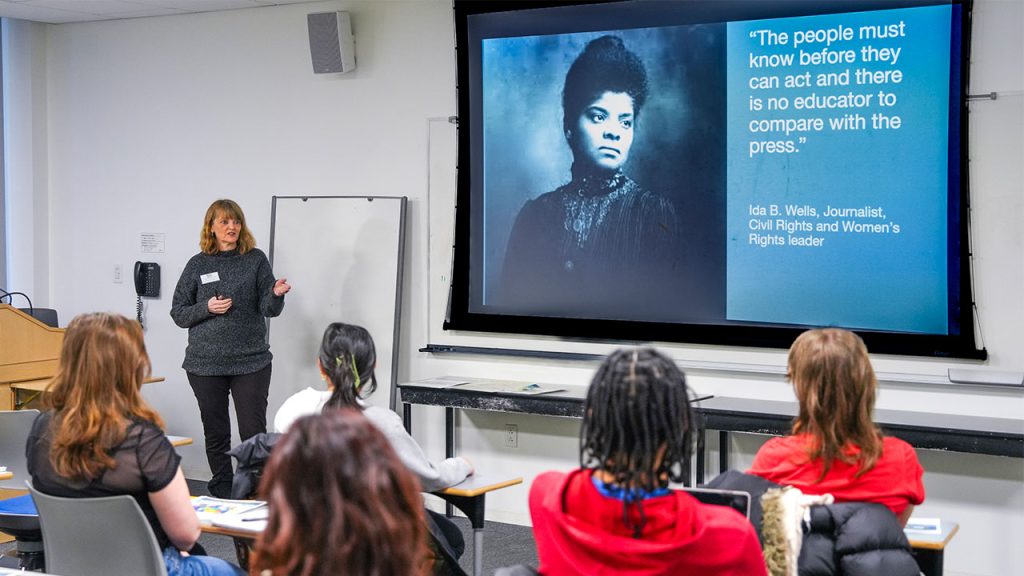
A Sense of Values
Ashar Foley, Ph.D., a senior lecturer of communications and media studies who teaches the class, said she was inspired to partner with the collective after one of her students shared with her misgivings about journalism last fall.
“She said, ‘I want to major in it, but it seems like the mainstream media only reports on certain things and doesn’t tell the whole story if it contradicts certain official narratives,’” she said.
Foley encouraged her to try volunteering with the collective, and the students’ experience was so positive they decided to stick with journalism.
Foley brought members of the collective in to speak to her class in January, and students have been volunteering at the collective’s Kingsbridge office on Saturdays this semester.
“They can get a sense of what community values are and look like. This is a well-organized space, but it’s not glossy. It’s a place that operates on shoestring budgets and not according to values promoted by corporate media,” Foley said.
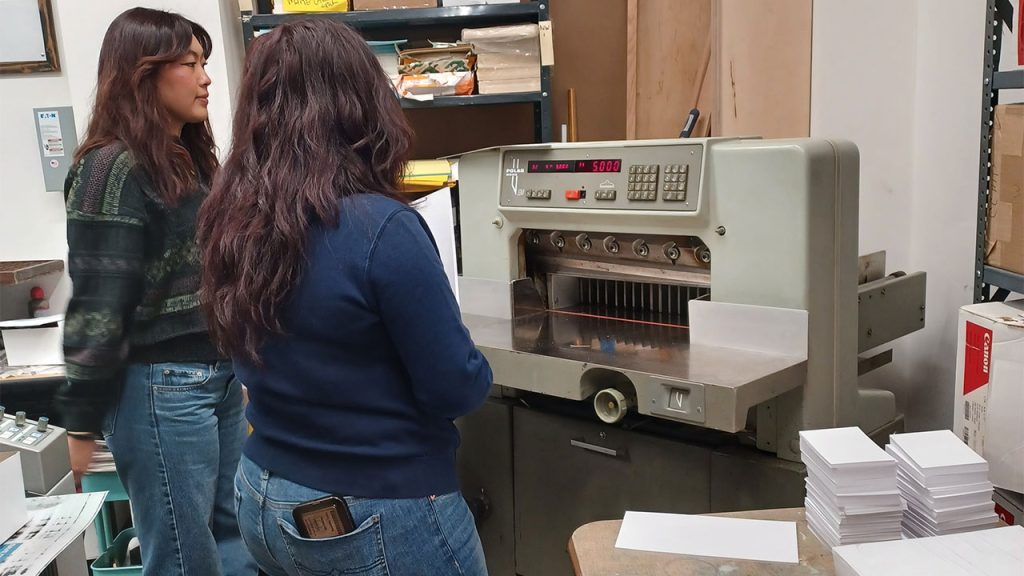
Independent Media Is Key
The collective’s focus on physical media is not accidental.
According to organizers, printed materials encourage face-to-face distribution and interactions that are critical for building strong community organizations.
As part of the class visit, Gabriel Guy, a first-year student from Morton, Pennsylvania, who is planning to major in anthropology and communication, helped stuff envelopes with a newsletter that one of the collective’s partners was creating.
“I thought it was cool to have [the Women’s Press Collective]as a partner to our class because right before I visited, we were talking in class about media representation and the power of who gets to tell what stories,” he said.
Cathi Steele, a volunteer for the collective who spoke to Foley’s class at Lincoln Center, said independent media is key to improving the lives of local communities.
She noted that Fordham students helped with a zine for one of the collective’s partners. It will be given to tenants in a Bronx housing development that has been without heat or gas since last May.
“We’re joining together writers, printers, designers, with organizers of low-income and marginalized communities who really need a media that provides truthful, relevant information from their perspective,” she said.
“We like to say, ‘Don’t just criticize the media, organize it.’ We have to build a media that represents all of us.”
]]>The grant was a renewal of previous grants—five in all—awarded by the Mother Cabrini Health Foundation for GSE’s Clinical Mental Health Services in the Bronx Community (CCMH) program. The CCMH program supports the mental health of students in the Bronx, ages 7 to 17, and their families through telehealth counseling sessions and workshops. The foundation also renewed a separate grant that funds free classes for non-native English speakers.
“Amidst the current uncertain and polarizing sociopolitical landscape in the U.S., I am grateful to remain grounded through this grant as the CCMH team continues to accompany our clients in need,” said Eric C. Chen, Ph.D., a GSE professor of counseling psychology who directs the program.
“It aligns with Fordham’s Jesuit priorities of transformative learning and driving purpose and reinforces our commitment to ensuring that our work matters to others.”
The project, which first launched in 2021, is staffed by GSE master’s and doctoral students who work with students from 122 Bronx schools. The Mother Cabrini Foundation has contributed $1.7 million in funding since CCMH’s founding.
The new grant is notable because it allows Chen to expand the scope of the project.
This coming fall, two interns selected from the mental health counseling program will join the CCMH program. Once they receive training, the interns will conduct intake assessments and individual counseling for youth and adults, and also conduct workshops. An intern who speaks Arabic has already been selected, expanding services to English, Spanish, and Arabic speakers, many of whom are newly arrived immigrants.
The program will also continue to work closely with the seven Bronx community organizations that it partners with, including immigrant and disability rights advocacy groups Masa, Coalición Mexicana, and Sinergia.
A Lifeline for the Unheard
Maria Sol Anyosa, a doctoral student in GSE’s school psychology program who has conducted telehealth sessions with CCMH, called it “a lifeline for a community that often goes unheard, unseen, and underserved.”
“Being part of CCMH has allowed me to connect with individuals and families who carry immense burdens in silence, from trauma and grief to systemic inequities,” she said, noting that many clients come from undocumented families.
“These families live in constant fear, navigating unique and isolating challenges while doing everything in their power to create a better future for their children. Their resilience, courage, and strength have touched me deeply, reminding me why I chose this field and how vital it is to provide compassionate, accessible care.”
Jolene Trimm, Ph.D., GSE ’23, a post-doctoral fellow at Milestones Psychology who worked at CCMH as a GSE student, credited the program with helping her sharpen and gain skills and allowing her to grow from a clinical counselor to a supervisor.
“I have worked with CCMH from its start, and it has been amazing to see such real-world, very impactful work grow rapidly in a short time,” she said.
“Fordham prepared me to be both a researcher and clinician, with the hopes that I would use my knowledge to support the needs of diverse individuals in the community. CCMH has allowed me to do just that.”
]]>Students enrolled in the Ailey/Fordham BFA program did the same in an annual benefit dance concert on March 3.
“Ms. Jamison’s presence lives on through her strength and tenacity documented in every photograph lining our halls and through each person who has had a connection with Ailey,” said Layla Barber, a junior in the Ailey/Fordham program at Fordham College at Lincoln Center, at a pre-performance reception.
“She tirelessly continued Mr. Ailey’s vision that dance is for everyone.”
Barber is a recipient of the Denise Jefferson Memorial Scholarship, funded by proceeds from the annual benefit concert and presented to an Ailey/Fordham BFA junior and senior each year. She spoke to guests before the event’s dance program, where she performed the first dance of the evening.
She marveled at the fact that in 2026, she’ll earn dual bachelor’s degrees in dance and environmental science.
“Because of this program, I’ve been able to perform at legendary venues inside and outside of New York City, all while being able to study methods to correct the environmental damage our Earth is facing,” she said.
Reuniting with the Best of the Best
The evening brought together several successful Ailey/Fordham alumni, including Jaryd Farcon, a 2020 graduate now dancing with the New Jack Cole Dancers. He said the evening was a must-atttend.
“The Ailey/Fordham program is one of the best in the world. There’s nothing like it,” said Farcon, whose sister, Jhailyn, is currently enrolled in the BFA program and dancing on Broadway.
“When you just see a dancer walk into a space, maybe at another audition, you can just tell they’re an Ailey dancer because they’re so wonderful, they adapt to any type of dance, and they really stand out.”
Maya Addie, a 2021 graduate and leader of the BFA alumni affinity chapter who currently dances with the Rockettes, agreed.
“I remember myself as a freshman performing in this benefit concert, and it was really special. So to come back and be able to support the dancers when you know this is only the beginning for them is really cool,” she said.
Continuing a Tradition of Excellence
Fordham President Tania Tetlow connected the students’ dedication and passion to the legacy that Jamison created during five decades as a dancer and artistic director at the Ailey company.
She called the language of dance that Jamison passed on to students a “more powerful form of communicating than language itself.”
“That work has never been more critical than it is today for building empathy for the human experience,” she said.
“Ailey teaches our students these skills, and an unbelievable level of discipline and endurance and a willingness to expect nothing less than excellence from themselves.”
Melanie Person, director of the Ailey/Fordham BFA program, said all seven of the dances performed that evening were chosen because they were ones that celebrated Jamison’s legacy.
“It was a tremendous loss for us in the dance world when we learned of her passing in November, but her spirit looms large, and her presence is felt in this building,” Person said.
“She loved the students so much. She’d watch classes and offer a few words of advice to them. She’d participate in our orientation. So this is just the school’s way of celebrating her tonight and probably the rest of eternity.”

A sophomore at Fordham College at Lincoln Center, Magazine spent last fall interning with Fordham’s Office of Sustainability. His work included collecting data that the University will use to establish a framework to measure its sustainability performance.
He said his work not only helped him learn how to encourage sustainable practices, it also gave him the chance to make Fordham more sustainable.
“Part of being in a community of people that you come to know, and you come to care about, is also wanting to see it improve,” he said.
“So a lot of my perspective going into this internship has been ‘What ways can I improve the Fordham of tomorrow?’”
This Is My Community
Magazine’s interest in sustainability and climate issues also circles back to another community: his hometown of East Flatbush, Brooklyn. He lives there with his family and commutes to the Lincoln Center campus.
According to government statistics, the neighborhood’s lack of cooling infrastructure makes its citizens more vulnerable to climate-change-related heat waves than anywhere else in NYC, making the issue of sustainability very personal to him.
Along with several siblings, he’s part of his family’s first generation to attend college. The ability to major in environmental studies is what drew him to Fordham.
“When the neighborhood has any sort of disaster that can be enhanced by climate change, we feel it very hard,” he said.
“I live here. These are my neighbors, this is my community. I don’t want to see East Flatbush turn to charcoal in 2030 or 2050.”
Peeking Under the Hood
Magazine had participated in climate justice-related activities in high school, so when he learned about the Office of Sustainability’s internship program, he jumped at the chance to join the program along with 25 other undergraduate students.
Along with several other interns, he was asked to help the office gather data to fill out a framework known as STARS (Sustainability Tracking Assessment and Rating System). It was developed by the Association for the Advancement of Sustainability in Higher Education (AASHE) and is colloquially known as AASHE STARS. Institutions can earn AASHE ratings based on everything from sustainability-related courses to water usage.
There are 372 colleges and universities with AASHE STARS ratings ranging from bronze to platinum. Fordham will soon submit the data necessary to gain a rating as well.
For AASHE STARS, Magazine gathered data related to the University’s investments. Activists have long advocated that institutions that embrace climate change mitigation policies should reconsider supporting the fossil fuel industry through their endowments; at Fordham, President Tania Tetlow announced that Fordham’s Board of Trustees had created an Advisory Committee on Socially Responsible Investing, comprising students, faculty, administrators, and alumni, to discuss issues around ethical investments.
Magazine compared the experience to peeking under the hood of a car to see how the engine works.
“This was my first instance of being able to work in policy from inside the house instead of outside of it,” he said, noting that it deepened his understanding of the ways a large institution functions.
Improving the Fordham of Tomorrow
Gathering data and synthesizing it into a form that can be submitted for AASHE STAR consideration was somewhat tedious, but Magazine said it was worth it.
His takeaway is that Fordham is moving in the right direction when it comes to sustainability. In addition to embracing renewable energy and working with local communities to help them deal with climate change, establishing benchmarks such as an AASHE STAR rating moves the University toward a greener future.
“Even though things move slowly, they’re going to keep moving. They’re not going to stop,” he said.
“That it is something that we can work on, and we’ll reach the point where we get to that destination.”
]]>The cafe will open in September at the Lincoln Center campus in 140 West, in the garden-level space currently occupied by Argo Tea.
Wanted: A Student CEO
Saxbys, which bills itself as “an education company disguised as a coffee company,” will recruit students to run the cafe, including a “Student CEO” who will be responsible for all operations for a six-month term. In exchange for salary and course credit, the CEO will oversee 15 team leads and roughly 34 team members.
The first Student CEO will be chosen from the Gabelli School of Business, while successive ones will be drawn from throughout Fordham’s student body. The other positions, including team leads, will be open to all Fordham students from the start.
When the cafe opens, Fordham will join roughly 30 other colleges, primarily in the Northeast, that operate cafes in partnership with Saxbys. Fordham will be the company’s first New York City partner.

Contributed photo
“When people support a Saxbys, they’re not just getting a great product and a great hospitality environment. They’re supporting the next generation of leaders and entrepreneurs,” said CEO Nick Bayer.
“These are really hard jobs with high expectations where young people are taking what they learned in the classroom, they’re getting a learning experience, and they’re coupling those two things together to go off and be great leaders.”
Saxbys arrival marks the second student-run coffee shop at Fordham, joining Rodrigues, located at the Rose Hill campus.
Argo Employees to Stay at LC
Since Saxbys is run exclusively by students, the current Argo employees will remain valued members of the Ram Hospitality team at Lincoln Center.
Saxbys Staples: Cold Brew and Grilled Cheese
The cafe will feature an expansive menu anchored by cold-brew coffee, grilled cheese sandwiches, and smoothies. Bayer said the expanded offerings will extend the appeal of the space beyond mornings when coffee and tea are in higher demand.
“We really want to continue to energize that space and make it one that people are excited to visit morning, noon, and night,” said Bayer.
New Kind of Experiential Learning
Vincent DeCola, S.J., assistant dean at the Gabelli School, said the Saxbys partnership will dramatically expand opportunities for experiential learning–a priority for the business college.
“They’ll be learning in real-time about supply chains, maintaining inventory, planning for the pricing, the placement of things, and promotions,” he said.
“It’s a terrific experience, especially in areas like marketing, entrepreneurship, and accounting.”
Because the Student CEO role will be a full-time position, DeCola said he expects those students’ course load to be adjusted accordingly. Credits will be applied from their time managing the cafe, and they’ll also be given the opportunity to take a night class.
He said he was encouraged by the fact that the arrangement has been successful at so many other colleges, including St. Joseph’s University, a Jesuit school in Philadelphia. He noted that one of the supports that Saxbys offers to student CEOs is access to a group of former Student CEOs who they can turn to for advice.
“We anticipate that we can do this in a way that’s meaningful, and we’ll find things to improve each semester as we move forward,” Father DeCola said.
The Fordham community is invited to a tasting event at 1 p.m. on Wednesday, Feb. 26, in the Garden Lounge, on the ground floor of 140 W. 62nd St.
]]>Thanks to a recent visit from Joseph P. Kennedy III, they’ll have a better idea of what to expect as they explore the region and learn about its past.
“You expect politicians to put a veneer over everything, but he was very honest about the situation on the ground in Northern Ireland,” said Rylan Carroll, a sophomore at the Gabelli School of Business and one of the 11 students who will travel to the region for eight days in March.
To prepare students for the trip, Fordham hosted Kennedy, a former U.S. representative from Massachusetts and U.S. Special Envoy to Northern Ireland for Economic Affairs from 2022 to 2024, at a Jan. 23 luncheon at the Lincoln Center campus.
Exploring a Troubled History
When the Global Outreach students visit Northern Ireland, they’ll spend time in Belfast and Derry and learn about the sectarian strife between Catholics and Protestants that dominated the region for decades, long known as “the Troubles.”
Active hostilities ceased in 1998, but tough questions remain about how a society heals from the trauma of a conflict that lasted nearly four decades and resulted in an estimated 3,500 dead and 47,500 injured. The conversation with Kennedy in January touched on many of those questions.
For instance, Carroll said, Kennedy recounted his conversations with a man whose father had been killed in the conflict. His father’s killer had been freed from prison as part of the peace process, and he still struggled with the notion that the man was walking the streets today.
“We can go on talking about religious pluralism, but there are also … real-world consequences to all of the movements that have happened there,” said Carroll, a global business major with a concentration in marketing.
Carroll signed up for the Global Outreach project because he’s interested in religious pluralism and because he sees parallels with marketing, which is fundamentally about understanding how people react to messages and make decisions.
“We talked a lot about how people came to decisions to end the Troubles,” he said.
“Like, can you live with the people who have committed these acts against you and be at peace? Can you come from a perspective of wanting your children and their children, and so on and so forth, to be all right?”
John Gownley, director of Global Outreach, credited James Haddad, a senior at Fordham College at Rose Hill, with proposing Northern Ireland as a destination. Once that was settled, Gownley said, the next step was finding a speaker to join the nine-week formation period during which students discuss race, religion, and other topics relevant to their destination.
Kennedy was an obvious choice, having spoken about Northern Ireland as the speaker at the University’s 179th commencement, where he also received an honorary degree. Gownley said Kennedy is the kind of speaker he hopes to recruit for future Global Outreach trips.
“We’re trying to find opportunities beyond the classroom for students to get real face time with people who work [in the region they’re visiting], whether it’s in government, politics, religion, or social justice movements,” he said.
]]>